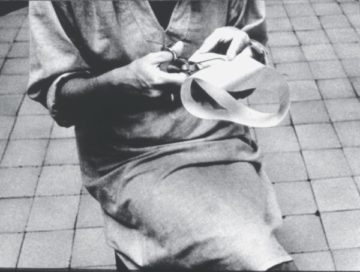Megan A. Sullivan at nonsite:
 It is interesting to see how insistently Clark describes her artistic practice as oriented toward an “ethico-religious” goal—and not just to the making of “one surface or another”—as there are few signs of that central preoccupation in her earlier writings. This confession, I think, should be read as an exercise in self-criticism. In confronting Mondrian, Clark appears to be confronting herself, although at the same time she seems to expect recognition from a person she considers to be a kindred spirit—another mystic. To describe Mondrian as a mystic is of course not uncommon. Yet the term has been used rather loosely, either to refer to Mondrian’s interest in esotericism (especially the Theosophical teachings of Madame Blavatsky) or, more generally, to the sense of spirituality that infused many early projects of abstraction. In her letter, however, Clark invokes a rather different notion of mysticism. Neither school nor doctrine is involved in it but rather a particular kind of experience.
It is interesting to see how insistently Clark describes her artistic practice as oriented toward an “ethico-religious” goal—and not just to the making of “one surface or another”—as there are few signs of that central preoccupation in her earlier writings. This confession, I think, should be read as an exercise in self-criticism. In confronting Mondrian, Clark appears to be confronting herself, although at the same time she seems to expect recognition from a person she considers to be a kindred spirit—another mystic. To describe Mondrian as a mystic is of course not uncommon. Yet the term has been used rather loosely, either to refer to Mondrian’s interest in esotericism (especially the Theosophical teachings of Madame Blavatsky) or, more generally, to the sense of spirituality that infused many early projects of abstraction. In her letter, however, Clark invokes a rather different notion of mysticism. Neither school nor doctrine is involved in it but rather a particular kind of experience.
more here.
